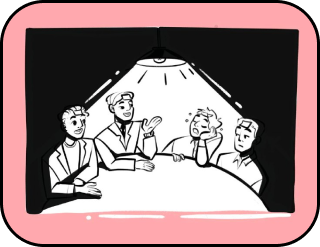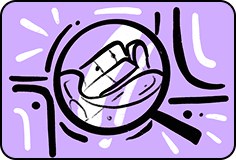The world of web 2.0 vs. the world of web 3.0: the most anticipated duel of the 21st century
In the midst of a crowd of enthusiastic spectators, on a smooth platform shielded from the sun and dust, two titans of the digital era faced off — the World of Social Networks 2.0 and the World of Decentralized Internet Web 3.0.
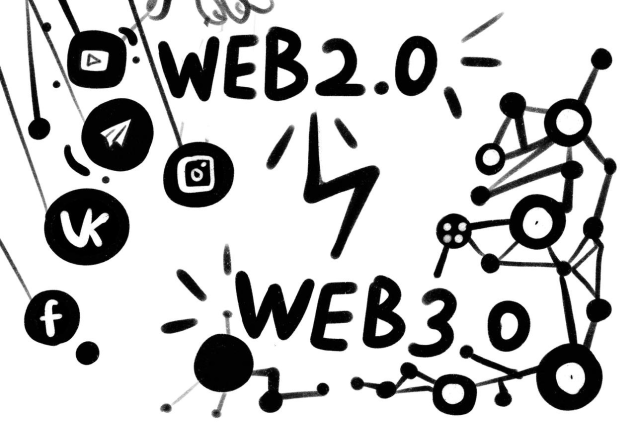
This duel was essential for our modern-day heroes to present their unique philosophies and approaches to life on the internet, without which we cannot imagine our future existence. This time, what’s at stake is their reputation, and they must fight fiercely for it.
Let’s meet the first contender in this showdown — the familiar World of Web 2.0, a child of the 2000s, the network of interactive websites and platforms where users, not administrators or resource owners, create the content. The typical representatives and supporters of the World of Web 2.0 are well-known players like Facebook, YouTube, Twitter, TikTok, VKontakte, and Telegram. They all share one common feature: a focus on creating user-generated content and fostering social interaction.
Thanks to the World of Web 2.0, the modern internet became more social, interactive, and accessible to everyone. Additionally, Web 2.0 contributed to the creation of cloud storage, where virtual content is preserved on public servers, enabling anyone to recover lost information and access it at any time.
On the other side of the barrier stands the relatively unfamiliar World of Web 3.0, which emerged in 2007. Devoted fans lovingly call it “transcendent,” as this yet-to-be-fully-understood contender lays the foundation for the next generation of the internet. It seeks to establish a more intelligent and semantically interconnected interaction between data, applications, and users. This World symbolizes the shift from passive content consumption — often unreliable and shaped by the subjective opinions of the majority — to equality between users, internet resources, and published content.
The Ideology of the World of Web 3.0 is Freedom and Security. In this world, no one imposes popular but questionable content on users. Everyone has the freedom to choose what to watch, read, or listen to based on their own interests and the call of their heart, rather than relying on external ratings and reviews. Any information within the watchful eye of the World of Web 3.0 is distributed across the network rather than stored on the servers of major corporations, ensuring there is no control from third-party organizations. This world hands control of data back to its rightful owners — the users. Moreover, the World of Web 3.0 often enters into smart contracts with users, enabling agreements between two parties without the need for intermediaries.
The audience gathered in the stands held their breath, eagerly awaiting the thrilling duel. The familiar versus the unknown, reputation versus purchased reviews, consumption versus mindfulness… Let the legendary battle begin!
Want to keep your word? Don’t give it lightly.
The World of Web 2.0 is the first to speak, dressed in a sleek black suit adorned with patches featuring the logos of every social network in existence.
“I am the king of content! I bring people together, allowing them to share likes and comments, showcasing their engagement and interest!” he proudly declares, adjusting his smartwatch.
The referee nods and grants the floor to his opponent.
“I am here for justice, to decentralize your boredom and return control of data to its rightful owners,” boldly announces the World of Web 3.0, clad in a designer NFT cloak featuring blockchain logos, surrounded by hovering drones.
The Supporters Applaud, Cheering for Their Favorites and Chanting Their Names. The duel is about to begin.
Both duelists stepped forward to meet each other and pulled their rapiers from their sides. One — the rapiers dropped, pointing downward. Two — the rapiers rose to face level. Three — the opponents separated, taking their positions and assuming combat stances, awaiting the signal to begin.
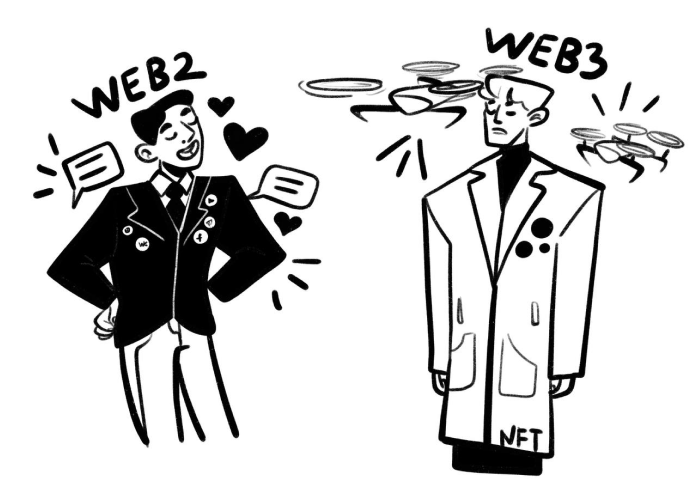
80% of success is just showing up at the right place at the right time.
The World of Web 2.0 made the first move:
“I am a social network on steroids! I have millions of users who rack up views and grow their followers by creating user-generated content!” he shouted, thrusting the tip of his rapier straight at his opponent.
The World of Web 3.0 skillfully parried the attack:
“Everyone knows that most of the reactions from your followers, which you’re so proud of, are bought. I can post a piece of inflammatory content on any of your social networks and then head to a paid service to buy as many views as I want. Your algorithms will then push my post to the masses without even checking its content. I, on the other hand, give people the freedom to follow content they deem trustworthy and valuable, without blindly following the crowd or falling for the manipulations of ‘top’ creators with unverified reputations.”
The rapiers clashed; both duelists displayed impeccable combat skills. A step forward, a thrust, another thrust. A hit.
Sensing his authority slipping away, the World of Web 2.0 resorted to an old trick. He disarmed his opponent with a sharp move and exclaimed:
“I have algorithms that help people bridge distances and spread ideas across the globe!”
A swing of the rapier, a thrust, but the World of Web 3.0 raised his left hand to the judge, halting the fight. The judge ruled the attack invalid and resumed the duel.
“Algorithms, you say?” The World of Web 3.0 launched a counterattack. “Your algorithms are as reliable as finding a unicorn in the woods. A truly talented person might never gain recognition with your systems because those same algorithms would suppress their reach and bury them in shadow bans. Meanwhile, someone else posting absolute nonsense might skyrocket in views and popularity for no discernible reason.”
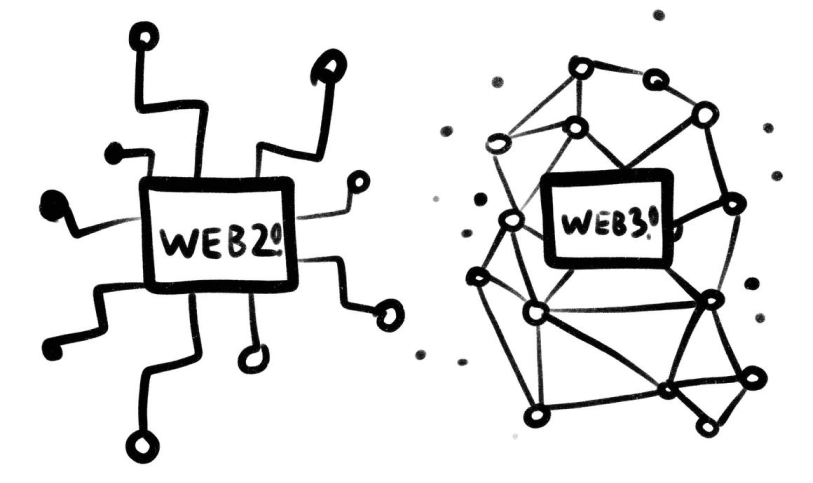
The World of Web 3.0 pressed his attack even harder:
“I bring equality to the table. Every talented individual has the chance to monetize their content and earn from it. And I offer decentralized platforms where anyone, if they wish, can create their own metaverse or 3D virtual world to interact with others.”
An argument worthy of Tim O’Reilly! Another thrust, and another. Could it be that the World of Web 2.0 has no response?
“I protect against fake news and prioritize information security!” growled the World of Web 2.0, his eyes flashing as he struggled to maintain his composure.
Always calm, the World of Web 3.0 laughed at his opponent’s bold claim. Dodging a lunge, he countered:
“Bravo, my friend, bravo! But what about the fact that you often sell user data for your own profit? How do you explain that after someone registers on your platform, any hacker can easily access their IP address, home address, passport details, and even the types of devices they use to browse social networks, down to their physical location? Do you ever verify the content of scammers, whose victims number in the hundreds every day? And what about the targeted ads that pop up on every site moments after someone merely thinks about something? How do you explain that?”
A thrust.
The World of Web 2.0 was visibly enraged. He launched a flash attack, forcefully pushing his opponent back.
“There are villains and scammers everywhere! And as for the user data I collect and sell… you have no proof!”
A Thrust.
The World of Web 3.0 takes a hit as he notices Mark Zuckerberg scurrying past the dueling track, eyes cast downward in shame.
What an unfortunate moment! But back to the duel.
Someone in the crowd throws a phone at the combatants, another starts frantically deleting downloaded apps, and someone else hurriedly changes their home address, just in case.
“And what can you offer them? How do you fight against fraud and the leakage of confidential information?” the World of Web 2.0 asks, anticipating his victory.
He makes a decisive thrust toward his opponent but misses.
“What happens in Vegas stays in Vegas. What’s written on the blockchain stays there. I have smart contracts that protect users from fraud and even build trust.
Even with the greatest will, no one can deceive anyone because the blockchain system records every single action, and it stays with you forever. As for confidential information, I don’t need it. Each user can decide for themselves what information to share and what to keep private.”

I read your thoughts. And I have for a long time. Not just yours.
The clash of blades fills the dueling arena with sound. The opponents attack from all angles, blocking each other’s moves without mercy.
“Billions of users worldwide!”
“Fake avatars!”
“Anonymity!”
“Fictitious names!”
“Guaranteed equal rights and fairness!”
“A safe internet!”
The World of Web 3.0 occasionally pushes into his opponent’s territory, forcing the World of Web 2.0 to defend himself, exclaiming:
“Unfamiliar! Unconventional! Unconvincing!”
The World of Web 2.0 tries to force the World of Web 3.0 off the track with sharp strikes, but the latter holds his ground confidently:
“Digits. In my world, everything is a digit. Actions are digits, reputations are digits. Fairness? That’s a digit too. What could be safer?”
Thrust. Thrust. Thrust.
The stands have fallen silent, the spectators who witnessed the epic duel have gone home, but the battle between the two worlds continues to this day. Only now, it takes place in the minds of people.
Each of us can influence the outcome of this duel by deciding how to engage with the digital world: through likes, subscriptions, and registrations on social networks with their familiar attributes but constant risk of deception. Or by choosing freedom and the opportunity to be a full-fledged creator of content on the internet.
The World of Web 2.0 instantly captivated us with its accessibility and possibilities. But the World of Web 3.0, it seems, must still be earned.
Only cats with VR goggles have already made their choice. Now they are only concerned with one question: “When will we finally be able to play cat simulators in the metaverse?”
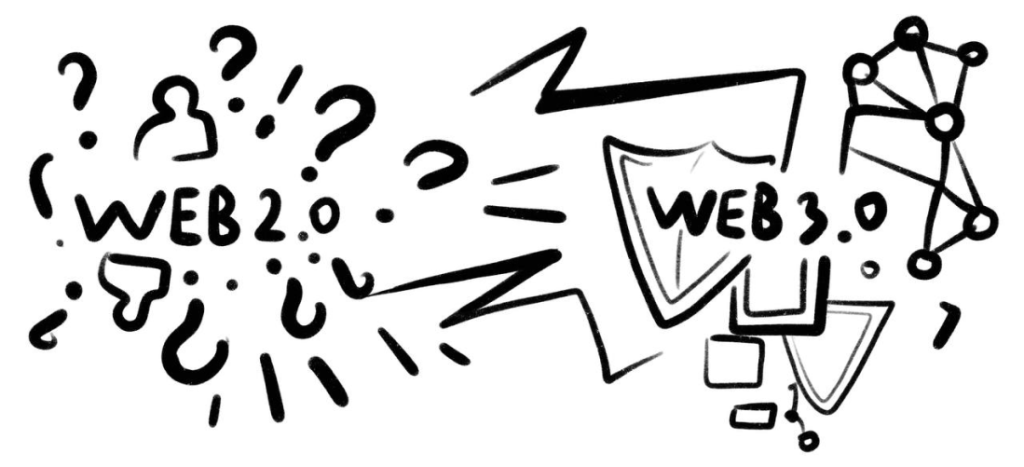
The micro world makes particles dance to the melody of probability.
Thank you!


